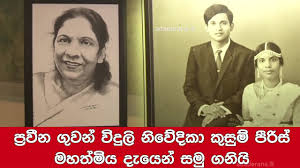The tragic news on, the veteran radio announcer, lyricist & dubbing artiste, Kusum Peiris havingto answer the inevitable call in life, on the 21stJuly 2019, at the age of 71,managed to bring tears to eyes to everyone who idolised her. She was a household name in Sri Lanka for many years as a radio announcer; later blossomed as a dubbing artiste. Her golden voice did travel across to homes, cars, vans, cafés, hotels and every nook and cranny on a daily basis in Sri Lanka, from morning until evening, through Radio Ceylon frequencies. Apart from being a veteran senior radio broadcaster and a producer, attached to the Sri Lanka Broadcasting Corporation, she was known as an illustrious icon on radio drama too.

Apart from appearing behind rolled cameras, she gave ‘life’ to many a female character in numerous dubbed foreign language films. Her affable voice did complement with scores of beautiful female actresses on the cinema screen to make the spoken dialogues effective and become congruent with each character on the screen. Another talent, which cannot be ignored about her was her exclusive talent on Sinhala lyric composition. Her compositions always gave an added lustre and feeling to popular Sinhala singers to enhance their singing as a catalyst.
Metamorphosis
Kusum Peiris participated in the ‘Radio Rangamadala’programme when she was a young student. In 1965, she was selected as a Grade ‘A’ drama-artiste; in 1972 as a Relief Announcer of the SLBC and in 1976, she was made permanent as an established announcer of the Corporation; she was promoted in 1986 to the status of Grade ‘A’ Announcer followed by a promotion as a ‘Super Grade Announcer’.

Her earlier colleagues at the SLBC were Tilaka Ranasinghe, Tilaka’s brother Douglas Ranasinghe, Indra Ramanayake, Samadara Kottage, Somasiri Chandrasena, Mala Vithara, Ariyasiri etc., who joined the Radio Ceylon as relief announcers .
Apart from radio announcing, she became involved with the dubbing of voices to the Rupa Vahini, when the television was launched initially in Sri Lanka. In fact, she was part of the Titus Thotawatte’s dubbing team that enabled her to simulate her voice to many leading female characters in films. Other tentacles of her refracted talents made her a professional composer of lyrics to many Sinhala songs and managed to display her writing skills on tele-drama scripts too. As a thespian, Kusum Peiris participated many Sugathapala Silva’s radio drama and others productions by Bandara Wijetunge & P.Welikala. Some of her prominent radio plays could be recalled as ‘Monerathenna’, ‘Muwan Palessa’, ‘Kumbure Gama’, and ‘Sapumali’.
Scripts authored by Kusum Peiris that were dramatised include ‘Pahan Taruwa’and ‘Pahan Siluwa,’a children’s drama based on research done by the UNICEF on Asian countries and ‘Pahan Taruwa’was chosen as the best Radio Drama encompassing a love story based on teenagers
Some of her lyric compositions included: Vinodini’s ‘Asura Sanin’, ‘Eka Mohotakdee’, ‘Niranjala,’ Bandara Athauda’s‘Sihinayaki Oba’, Abeywardena Balasuriya and Niranjala’s ‘Nissansale MaThaniyen’, Edward Jayakody’s ‘Gan Ewre’, Victor Ratnayake’s ‘Hitha Gawa Danga Kala’, Bandara Athauda’s ‘Sithuwili Siravee.’

Ambition
There was hardly any competition those days when she became a radio announcer. She never considered being an ‘announcer’ at the Radio Ceylon as a job, but she was motivated by her ambition to educate the audiences on the one hand, and to make radio listening popular on the other, because she always believed that listeners were announcer’s closest friends, and a radio announcer ‘those days’ had ‘access’to every household and motorists. In short, an announcer was constantly in communication with the public.
She never considered participation as radio drama artiste also as a job. True, she needed money to live and other necessities in life, but she always believed that money should not be made the mainbenchmarkfor an announcer without dedication. So much so, most of her involvements with the radio made her believe that Broadcasting Corporation was her ‘Mahagedara’ (ancestral home), and she always gave credit to the Radio Ceylon for helping her to ascend to the top.
Apart from possessing a clear concise and a projecting voice to be an announcer, she believed in other basic qualities such as an elementary overall general knowledge with world affairs too, should an announcer aim at becoming an efficacious radio announcer. She was in the opinion that such announcements always made richer and carried as an additional output, rather than reading like a school girl looking at a written script! She strongly believed in the theory that rise or fall of an announcer is inversely proportional to the broadcaster’s performance. In 1985 she received the Presidential Award for the best and the most popular announcer of the year.
Meeting in London
The writer recollects how he met with Kusum Peiris for a press interview for a London based English tabloid newspaper on the verge of her departure from London in the year 1991, during her second visit to the UK. Her visit to the UK was during the Sinhala New Year celebrations organised by a group of Sri Lankan expatriates in London. During that era, SLBC hosted and broadcast a special series of programmes during the Sinhala New year season called ‘Lowa Wataa Avurudu,’to project how the Sri Lankan expatriates scattered around the world upheld and propagated their inherent cultural values’ (Avurudu Sirith Virith), despite being thousands of miles away from home.
In the previous year too (1990) she presented this ‘Lowa Wataa Avurudu’ programme from East London. The SLBC pre-arranged announcers to go to different countries each year to observe and project how the Sri Lankan communities living overseas preserved and propagated their culture, especially during the festive season. In doing so, the SLBC staff did cover many countries such as Australia, Doha and many parts of the Middle East etc.
We discussed on advantages, drawbacks and the kind of impact including feedbacks on those special programmes that were monitored by the SLBC. In reply, she indomitably fired a question back at the writer to know as to why did the SLBC continue such programmes on an annual basis, if not popular? She seemed to believe that the cardinal point being, although many Sri Lankans had left their motherland due to multifarious personal reasons, yet in their heart of hearts, there existed an inexplicable urge deep-seated within them towards the motherland, despite living thousands of miles away from home.
Celebrations in London
Kusum Peiris did transmit via her programme from London, Seth Pirith, as a soothing preamble, in liaison with the expatriate organisers, to the home audiences with a full display of sweet meats laid on tables in London, akin to Sri Lankan home preparations. Her programmes also included the traditional rituals such as offering of sheaves of betel leaves to the elders; playing Raban; observing ‘ganu-denu’ (exchange of money) in a similar fashion during Sinhala new year observations.
Having been to London on two occasions the writer wanted to know what she thought of life in England in general. Her answer was simple and sweet: “I have come here only on two short trips, unlike you who have been living here for years, but what I have seen so far is that “ the life style in the UK is very much organised and methodical, road traffic is well disciplined and the houses are kept neat and tidy and everything is very pleasing to the eye, except of course everyone seems to be in a mighty hurry and always seems to be on run”. She certainly was a professional and a diplomat too.
May she attain Nibbana
pic.credit: google photos






